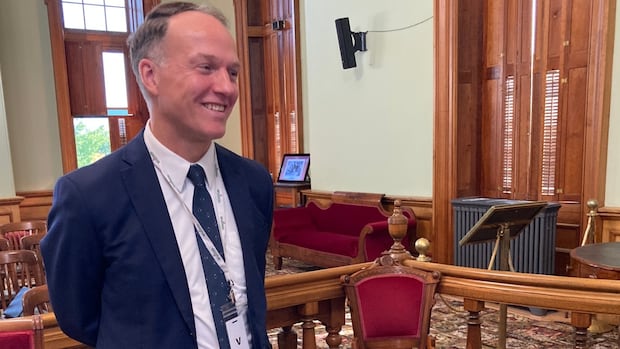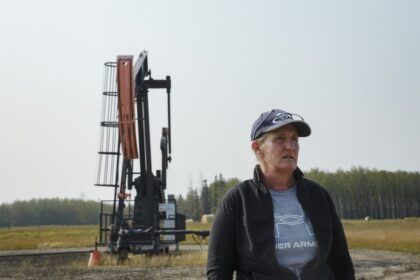New BrunswickNew Brunswick’s largest forestry company has warned the Holt Liberal government that stricter clean-air rules to reduce pollution could come at an economic cost to the province.Committee of MLAs hears from researcher on links to illness, then is warned to be careful about stricter rulesJacques Poitras · CBC News · Posted: Sep 10, 2025 3:37 PM EDT | Last Updated: 3 hours agoJ.D. Irving Ltd. official Andy Carson told MLAs that any update to the Clean Air Act should be incremental to avoid economic impact. (Jacques Poitras/CBC)New Brunswick’s largest forestry company has warned the Holt Liberal government that stricter clean-air rules to reduce pollution could come at an economic cost to the province.J.D. Irving Ltd. told the legislature’s climate change and environmental stewardship committee that an update to the Clean Air Act must be gradual to avoid harming an already fragile industrial sector in the province.”We think it’s important to prioritize and consider the broader economic context we’re in as we think about changes going forward,” Andy Carson, the company’s vice-president of government relations, told MLAs.That warning came after a medical researcher told MLAs he sees a link between sulphur dioxide pollution and high illness rates in New Brunswick — and urged the province to adopt more stringent legislation.WATCH | Committee hears duelling opinions on future of Clean Air Act: Daniel Saucier, a research fellow and adjunct professor with the Université de Sherbrooke’s New Brunswick medical training program, told the committee Wednesday that sulphur dioxide rates “are linked to a higher risk” of amyotrophic lateral sclerosis, or ALS, in the province. “While we can’t say that it’s solely responsible … it is a key piece of the puzzle,” he said.”It can’t be explained by chance alone,” he added later in an exchange with Liberal MLA Marco LeBlanc. Saucier said one cluster of cases of ALS — a nervous system disease that causes loss of muscle control — was in Bathurst, not far from two large sulphur dioxide emitters.He didn’t identify them, but N.B. Power’s Belledune coal-fired generating station is near the city, and Glencore operated a lead smelter in Belledune until 2019.Daniel Saucier, a research fellow and adjunct professor with the Université de Sherbrooke’s New Brunswick medical training program, said sulphur dioxide rates are linked to a higher risk of ALS. (Jacques Poitras/CBC)The committee spent Wednesday hearing from witnesses about how the province should update the Clean Air Act, which was adopted in 1997.Last week the province launched broader consultations on the update, which was promised in the Liberal government’s campaign platform last fall.Proposed changes include increasing the number of pollutants covered from five to 60 and updating objectives for many of them. Wednesday’s committee session showed two different concepts of how the government should proceed.Saucier called for requiring industries to have management plans for their pollutants and for more frequent updates to the act’s objectives, such as every five years, to keep up with new science.Irving, though, urged a more cautious approach, such as phase-in periods of five or 10 years for any tighter limits on pollution.”With all the current challenges that we have around the economy of the province, tariffs, trade uncertainty that is happening just about every day … we would request that this committee take a very hard look at balancing,” said Mark Mosher, the vice-president of Irving Pulp and Paper.Mosher noted that J.D. Irving has already lowered its emissions across its operations, including a reduction 90 to 95 per cent in its sulphur dioxide emissions.Asked by Green MLA Megan Mitton why that number hasn’t continued to go down recently, Mosher said the cost of reducing emissions gets exponentially higher the closer an operation gets to zero, and that makes it hard to compete with mills around the world.”Everything is always a trade-off in life. Is it possible to have zero-emissions facility?” he said.”A hundred per cent. I’m not aware of any, but the technology would exist, if you’re not competing in a global environment where jurisdictions don’t have the same regulations.” Carson said J.D. Irving has worked “very closely” with the province’s Environment Department since the adoption of the Clean Air Act in 1997, and the “collaborative” approach with industry should continue.The government is also inviting written submissions about the update to the act and will hold public consultation sessions next month.Environment and Climate Change Minister Gilles LePage was part of Wednesday’s committee session but wouldn’t comment in detail on the differing advice MLAs heard.”When you’re talking about sustainability, you’re looking at environment, economy and social acts, and of course our laws like the Clean Air Act should consider that,” he said.Asked whether the process would result in a more stringent act, LePage said “we have to adapt it to the realities of New Brunswick now and for the future.”ABOUT THE AUTHORJacques Poitras has been CBC’s provincial affairs reporter in New Brunswick since 2000. He grew up in Moncton and covered Parliament in Ottawa for the New Brunswick Telegraph-Journal. He has reported on every New Brunswick election since 1995 and won awards from the Radio Television Digital News Association, the National Newspaper Awards and Amnesty International. He is also the author of five non-fiction books about New Brunswick politics and history.
Province gets differing views on Clean Air Act











